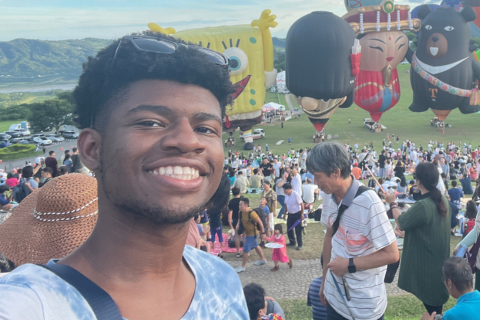
What’s your experience been like as an English Teaching Assistant in Taiwan?
I am currently in month 6/11 of my grant and have been enjoying living in Taiwan immensely! I was placed in Taitung, one of the smaller counties (population-wise) on the southeast coast, and it is such a beautiful area. I live with three other Fulbright ETAs in a 6-bedroom apartment, but housing can vary greatly based on your location and school placement.
I teach at a junior high school with a total of 78 students, and I have found both the teachers and students to be so welcoming and inviting. Even those who don’t speak as much English still have tried talking to me and offering me advice on how to make the best of my time in Taitung and Taiwan!
I have definitely been able to form a strong community, both with coworkers and with other Fulbrighters, so despite being in another country, I’ve never felt isolated.
What do you enjoy most about Taiwan?
Being a teacher with Fulbright Taiwan comes with its own set of benefits. Firstly, Taiwan has a lot of ETAs, so it’s easy to build community among Fulbrighters to curb feelings of isolation or homesickness. Still, you have a lot of freedom to immerse yourself in local communities.
School placements provide opportunities to make connections with colleagues and become integrated into the community surrounding your school. Fulbright Taiwan also requires 8 hours of community service per semester, giving you many opportunities to engage with children and adults in various parts of your city.
Advice for future ETA applicants?
For prospective Fulbright ETA applicants, I strongly recommend starting the application process early! I remember juggling schoolwork and the application at the same time, and life would have been so much easier if I had completed it during the summer.
Also, for those who are offered and accept a Fulbright grant, it is important to remain mindful of your reasons and goals for applying to Fulbright. The period between submitting your application and actually working in your host country can feel substantial, making it easy to lose sight of your original aspirations.
Therefore, it can be helpful to revisit your statement of purpose and personal statement essays before embarking on your grant and while you complete your grant to remain focused on your original objectives. Even if in the end you don’t do a Fulbright, the answers you provided to the prompts can serve as a guide for next steps in your life.
Any other thoughts?
Reflecting on my time with Fulbright so far, I have learned the importance of evaluating your current situation and adjusting goals and expectations accordingly. How I initially pictured my experience in Taiwan has differed from reality, but I have learned to leverage the available resources to make the most of my time in Taiwan. Enter your placement with an open mind, and you will find enjoyment in areas you wouldn’t normally expect.
In all, I am enjoying my experience with Fulbright. Even if you don’t want to work in Education long-term, working in a classroom helps you build transferable skills like communicating with a range of audiences and group management. For those uncertain about their post-graduation plans and hesitant to rush into a career, this experience also offers valuable time for self-discovery.
Free from the pressures of exams or impending assignments, there is ample space to experiment with different activities and narrow down which are worth investing more time in for you. Immersing oneself in a new culture not only fosters personal growth but also encourages questioning of deeply held beliefs about oneself and life in general.


